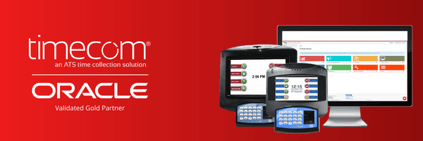Poor employee attendance is expensive. Some estimate the direct costs of unscheduled employee absences to be between $2650-$3600 per employee, per year. Those are the potential direct costs.
The indirect costs of high employee absenteeism range from low productivity of frustrated co-workers to reduced respect for management.

Absence Management Strategies for Oracle HCM Cloud Users
 If you are using Oracle as your HCM Cloud for HR, consider deploying the Time and Labor module for automated timekeeping. Encouraging good attendance is smart business.
If you are using Oracle as your HCM Cloud for HR, consider deploying the Time and Labor module for automated timekeeping. Encouraging good attendance is smart business.
Your Oracle integration with an attendance tracking system has a pivotal role in managing employee attendance.
It receives real-time attendance tracking data from your time clocks that managers and HR professionals can use to lower employee absence.
Companies often implement a new employee attendance policy that only addresses the consequences of poor attendance. Yet there’s value in reinforcing good behaviors. If you want an absence management program that improves employee attendance, add an incentive plan.
Important Considerations for Your Incentive Plan
Set goals for the program based on realistic expectations. Think inspirational yet achievable. Keep the program simple and describe it clearly in the employee handbook to avoid disputes.
Finally, don’t penalize employees for allowable unscheduled absences. If the absence is permitted by company policy or as a matter of law, using the employee absence against the worker may risk a lawsuit.

Sample Ideas
Choose rewards that have meaning and significance for the employee. Here are some ideas:
- Create a lottery for employees with perfect attendance, giving them a chance to earn more money or get extra time off.
- Plan a special event for employees who meet the attendance standards. The company might organize a quarterly outing for employees with the best attendance records. The outing could be an extended lunch at a nice restaurant or tickets to see a local professional sports team. Have a few key senior managers attend as well, so these employees get some extra facetime.
- Let employees trade in their unused sick days at the end of the year for cash or gifts or let them carry these days forward into the next year.
- Offer a special dinner or lunch with the CEO for employees with a perfect attendance record.
- Post the names of employees with exemplary attendance records publicly. Public recognition forums could include a wall of fame, a page of your employee website, or in an internal employee newsletter.
- Offer increased responsibility or leadership roles to employees with outstanding attendance records. Reinforce the message to employees that an exemplary attendance record is required as a condition for promotions and wage increases.
- If using oracle HCM Cloud, deploy Time and Labor module and integrate with a time clock.
%20-%20Data%20Collection%20that%20makes%20sense%20-%20Follwup%20graphic%20email.png?width=325&height=325&name=EATC2273%20-%20Intro%20to%20Timecom%20(3)%20-%20Data%20Collection%20that%20makes%20sense%20-%20Follwup%20graphic%20email.png) Focus on selecting the right incentives that will work in your company culture. A good employee attendance tracker program that rewards positive behavior is more effective for reducing absenteeism than punishing employees with poor attendance.
Focus on selecting the right incentives that will work in your company culture. A good employee attendance tracker program that rewards positive behavior is more effective for reducing absenteeism than punishing employees with poor attendance.
It can also help you gain insight into employee performance, scheduling practices, and the overall productivity of your workforce. By integrating Oracle with your employee time tracking system, you have access to the important data and analytics you need to support these efforts.
Check out a few other strategies to prevent absenteeism from costing your business money. And get in touch with our solution consultant today for all your time clock needs.







%20-%20Data%20Collection%20that%20makes%20sense%20-%20Follwup%20graphic%20email.png?width=325&height=325&name=EATC2273%20-%20Intro%20to%20Timecom%20(3)%20-%20Data%20Collection%20that%20makes%20sense%20-%20Follwup%20graphic%20email.png)
